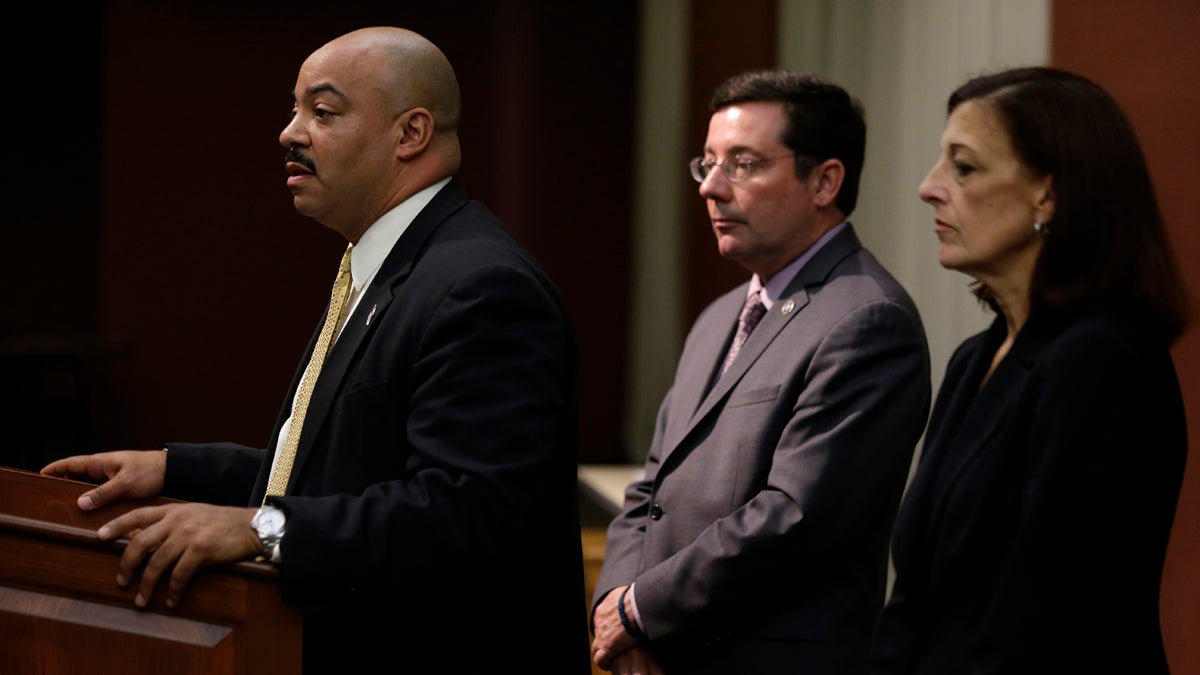Letter: Protect children and faith with religion-neutral laws

Philadelphia District Attorney Seth Williams, left, accompanied by 1st Assistant District Attorney Ed McCann, center, and Assistant District Attorney Joanne Pescatore, announces during a news conference on May 22 in Philadelphia that Herbert and Catherine Schaible, who believe in faith healing over medicine, have been charged with murder after a second child died of pneumonia. (AP Photo/Matt Rourke, file)
History professor Jonathan Zimmerman argues for religious exemptions from child health and safety laws as an essential protection of religious freedom and as harmless to children. In fact they are neither.
The following is a work of opinion submitted by the author.
History professor Jonathan Zimmerman argues for religious exemptions from child health and safety laws as an essential protection of religious freedom and as harmless to children. In fact they are neither.
Our First Amendment right to religious freedom includes an absolute right to believe anything we want and a right to practice our religion until we start infringing on another person’s rights. Yes, in 1943, the U.S. Supreme Court held that Jehovah’s Witness children had a constitutional right to refuse to salute the flag.
The very next year, however, the U.S. Supreme Court ruled in Prince v. Massachusetts that parents’ religious beliefs do not give them a constitutional right to refuse immunizations or engage in practices that compromise a child’s health or safety.
So why do 43 states have religious exemptions from child neglect laws? They have been enacted largely through lobbying by the Christian Science church. In 1974 the church persuaded the Nixon administration to require states to pass them.
The vast resources of a multi-billion dollar federal bureaucracy were pressed into service for the benefit of a church that promotes withholding of medical care from children. If states wanted federal money for their child protection programs, they had to enact a religious exemption to child neglect.
With federal money at stake, states rapidly began passing these exemptions. Many put them in both the civil and criminal codes.
By 1983, when the federal government discontinued its policy (and privately admitted it was wrong), every state except Nebraska had a religious exemption pertaining to medical care of sick and injured children.
Preventable deaths
These exemptions have contributed to scores of preventable deaths of children. Some parents believe it is not only legal, but safe to rely exclusively on faith for healing a child when the law appears to endorse the behavior. The Christian Science church, for example, has told parents that legislators give them those exemptions because legislators themselves agree that Christian Science heals disease just as effectively as doctors.
About eight states have religious exemptions from manslaughter or negligent homicide charges. In Idaho a coroner does not even do autopsies when children die in faith-healing sects, because the law requires autopsies only when a crime is suspected, and the law allows parents to withhold lifesaving medical care on religious grounds.
Then there are states like Indiana, where a prosecutor said the law allowed prosecution only if the child died, but not if religion-based medical neglect left the child in a permanent vegetative state.
There are also states where prosecutors have filed charges under one section of the criminal code that did not have a religious exemption but courts have dismissed the charge or overturned a conviction because of a religious exemption in another section of the code.
Pennsylvania’s religious exemption is in the domestic relations code rather than the criminal code, but has still contributed to child deaths. Some public officials have said Pennsylvania parents have a legal right to withhold medical care on religious grounds, and criminal charges have been filed in only three of the 24 deaths of Philadelphia-area children in faith-healing sects posted on our webpage.
The exemption laws at least breed confusion as to the parent’s duty, while in our view the state should make its expectations crystal clear before the parent is in a healthcare crisis with a beloved child.
Court orders for medical care are good in their place, but they cannot be a substitute for a parent’s duty to provide medical care. Court orders work only if the court learns of a child’s illness in time to prevent injury.
Times have changed
Professor Zimmerman cites Mark Twain for the precept that we should not force a single kind of health care on parents regardless of their beliefs. Well, health care has evolved a great deal since Twain was around. Today antibiotics cure infectious diseases, and insulin manages diabetes.
Medical care is a state-licensed system with well-defined obligations to the state and its patients. It has data to show the effectiveness of its treatments. A doctor is obligated to use the most effective treatments available.
For those reasons and others, states should require all parents to provide medical care when necessary to prevent substantial harm. At the same threshold of seriousness in a child’s illness when a Methodist, a Jew, or an atheist has a legal duty to seek medical care, a member of a faith-healing sect should have that same duty.
—
Rita Swan is president of Children’s Healthcare Is a Legal Duty, a national membership organization headquartered in Kentucky.
WHYY is your source for fact-based, in-depth journalism and information. As a nonprofit organization, we rely on financial support from readers like you. Please give today.

